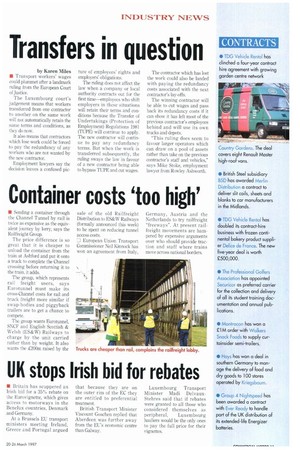Transfers in question
Page 13

If you've noticed an error in this article please click here to report it so we can fix it.
by Karen Miles • Transport workers' wages could plummet after a landmark ruling from the European Court of Justice.
The Luxembourg court's judgement means that workers transferred from one contractor to another on the same work will not automatically retain the same terms and conditions, as they do now.
It also means that contractors which lose work could be forced to pay the redundancy of any workers who are not wanted by the new contractor.
Employment lawyers say the decision leaves a confused pic ture of employees' rights and employers' obligations.
The ruling does not affect the law when a company or local authority contracts out for the first time—employees who shift employers in these situations will retain their terms and conditions because the Transfer of Undertakings (Protection of Employment) Regulations 1981 (TUPE) will continue to apply. The new contractor will continue to pay any redundancy terms. But when the work is transferred subsequently, the ruling sways the law in favour of a new contractor being able to bypass TUPF: and cut wages. The contractor which has lost the work could also be landed with paying the redundancy costs associated with the next contractor's lay-offs.
The winning contractor will be able to cut wages and pass back its redundancy costs if it can show it has left most of the previous contractor's employees behind and will use its own trucks and depots.
"This ruling does seem to favour larger operators which can draw on a pool of assets rather than take on the previous contractor's staff and vehicles," says Mike Stoke, employment lawyer from Rowley Ashworth.
















































































































